As a parent, you are responsible for taking care of your children, even if your marriage ends in separation or divorce. Child custody in Ontario is complex, and you must understand the different nuances in the legal system to determine the best course for your specific case.
So, if you want to know more about child custody, you have come to the right place. Our child custody lawyer in Ontario has created a comprehensive guide to help you understand custody in Ontario.
What is Child Custody in Ontario, Canada?
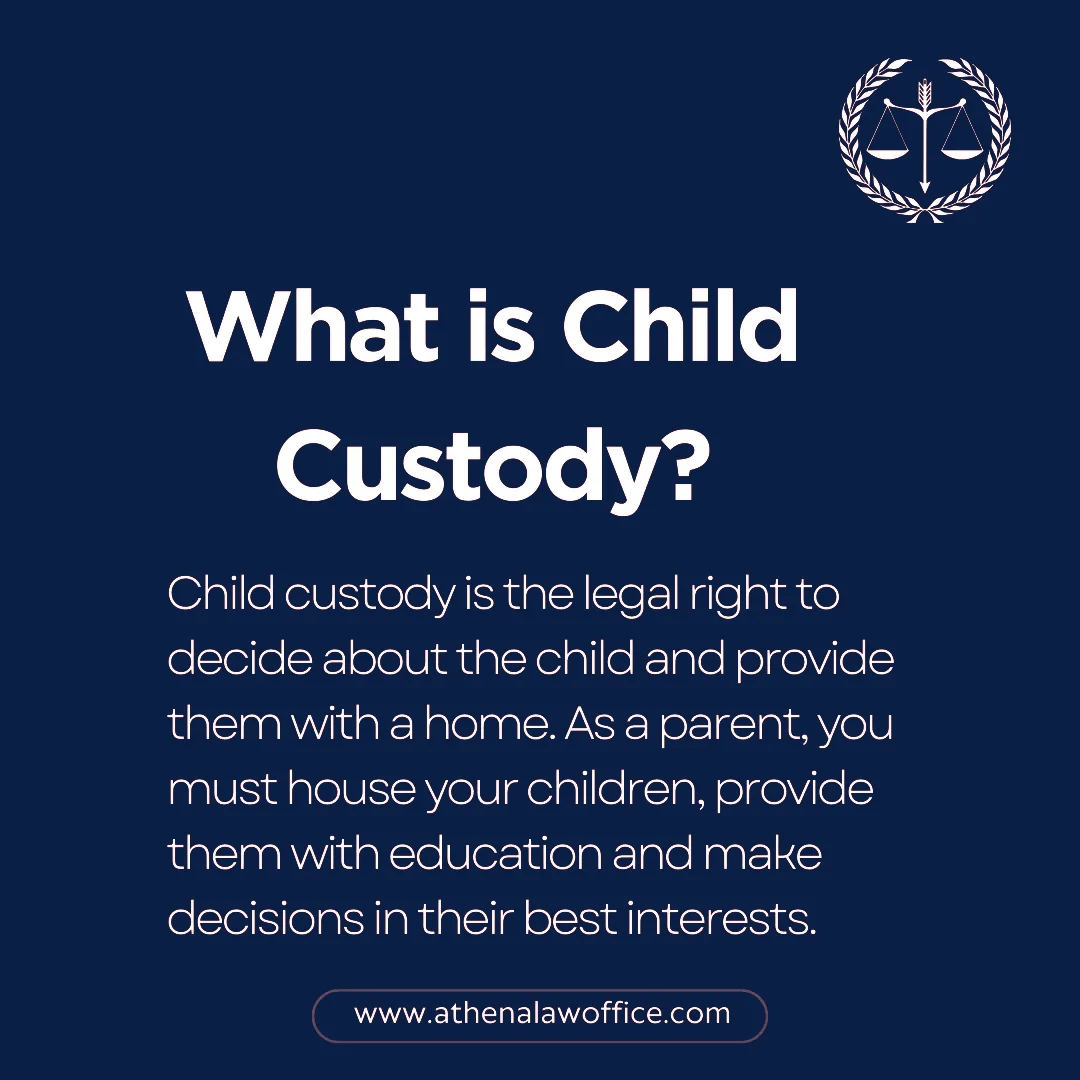
Child custody is the legal right to decide about the child and provide them with a home. As a parent, you must house your children, provide them with education and healthcare, and make decisions in their best interests.
Parents can focus on their interests during a divorce or separation and forget the child’s. However, the courts in Ontario will always keep the child’s best interests first in such cases.
Let us dive into child custody in Ontario deeply below.
What Constitutes the Best Interests of the Child?
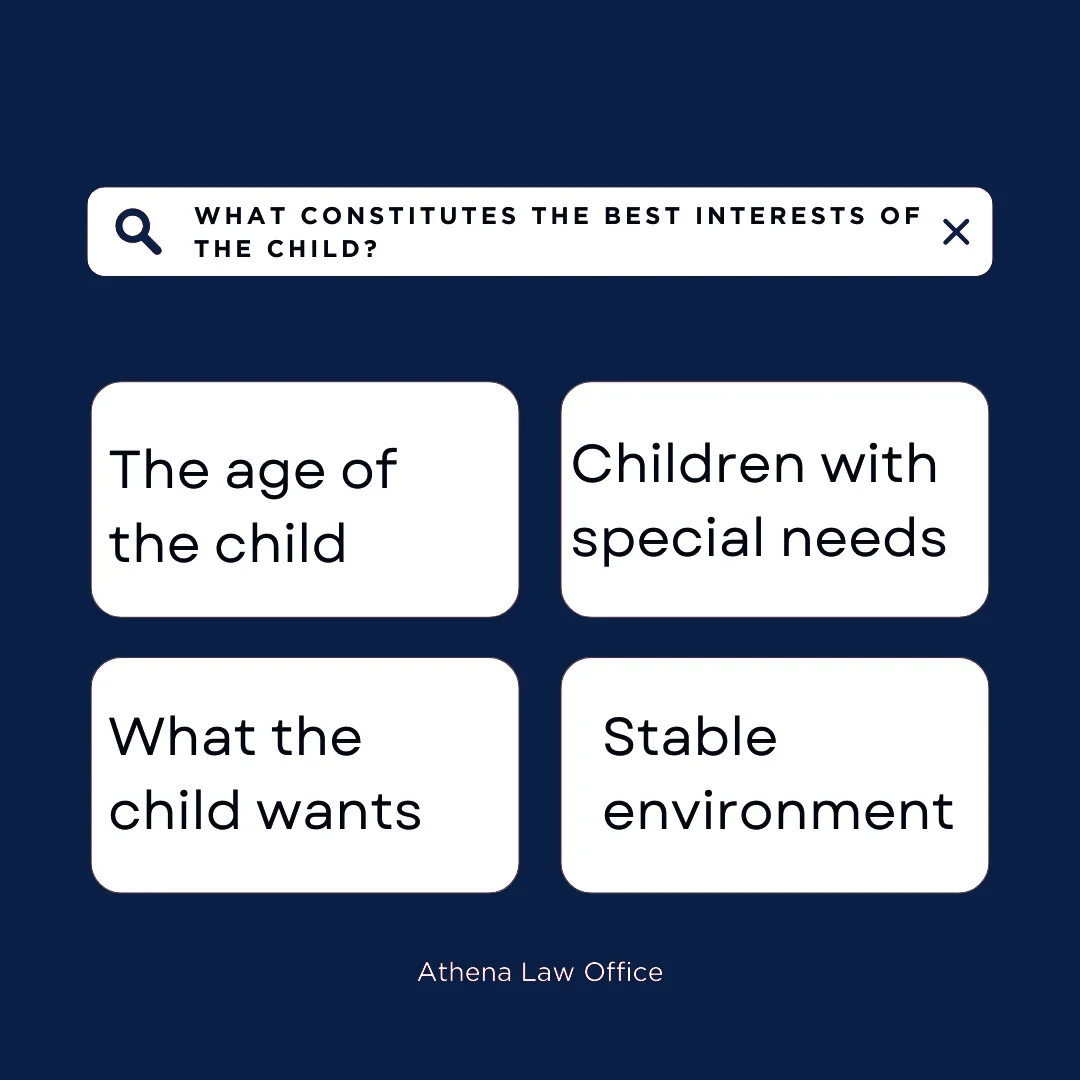
For child custody in Ontario, the courts will always consider what is best for the child. A few factors will be taken into account to determine the parenting arrangement that will work best for the children.
Let’s review the top factors that will constitute the best interests of the child under section 16 (3) of the Divorce Act and 24 (2) of the Children’s Law Reform Act:
- Age: Age is an important factor because younger children thrive on routine, and the court will ensure some stability for young children.
- Children with special needs or disabilities: These children will also require a much more consistent routine and attention. In such cases, the court may order one parent to spend more time with the child to guarantee wellbeing and stability.
- What the child wants: If the child is old enough to express what they want, then they will also consider what the child prefers and will determine if following their wishes will be in the child’s best interest or not.
- Ability to provide a stable environment: The court will also assess the ability of each parent to provide a loving and stable environment to the child. Courts will evaluate each parent based on their ability to fulfill the child’s developmental, emotional, and physical needs.
- Willingness to maintain relationships: Courts will also try to determine how willing each parent is to facilitate a positive relationship with the other parent. Both parents need to foster this positivity to ensure the children’s best interests.
- History of involvement and care: Courts may also consider whether one parent has been more involved and the primary caregiver for the child.
- History of family violence: If there has been a history of family violence or abuse from one parent, the court will also take this into account when deciding child custody in Ontario.
- More than one child: If you have more than one child, the court might prefer to keep the children together.
- Criminal or civil proceeding: When one parent is already involved with such proceedings, the court may give the child custody to the other, keeping the wellbeing and security of the child in mind.
- Strength and nature of relationship with each parent: The nature and strength of the child’s relationship with each parent will also determine their best interests.
There might be a few other factors that the court may consider based on your case’s unique circumstances.
However, these are the most important ones that the court will take into account when determining child custody in Ontario.
Changes of Terminology under the Divorce Act
In March 2021, there were some changes in the terminology of the Divorce Act. It set out that terms such as custody and access will not be applicable anymore.
Instead, the Act listed new terms that family lawyers and parents will have to keep in mind when creating parenting arrangements for child custody in Ontario. These include the following:
1. Access Changed to Parenting Time
The Divorce Act doesn’t recognize the term access anymore. Instead, parenting time is the correct terminology under the new changes.
This refers to the time that the children will spend in the care of one parent, even when the child is not physically with the parent. For example, if they go to school under the care of the parent, then this time will also be counted.
Typically, a schedule is used to set out the parenting time for each parent. So, if before 2021, you had access under the Divorce Act, it is now referred to as parenting time.
According to the Act, any parent with parenting time has the right to receive or ask for information regarding the child’s:
- Education
- Health
- Welfare
- And other important concerns
2. Custody Changed to Decision-Making Responsibility
Under the Divorce Act changes, custody is no longer a relevant term. Instead, anyone who has child custody in Ontario under the old order now has decision-making responsibility.
As the name suggests, it refers to the responsibility of making vital decisions about the child’s wellbeing, health, education, religion, culture, activities, and more.
If one parent is responsible for such decisions, then they are said to have sole decision-making responsibility. We will dive into this aspect in detail below.
3. Parenting Plan
The term parenting plan under the Divorce Act refers to how the parents will care for and make decisions about the children in both times. The key is to focus on what is best for the child rather than what is best for each of the parents.
4. Parenting Order
A parenting order is a court order that lists the important details regarding the parenting arrangements. These include things such as the parenting time of each parent, along with the decision-making responsibilities.
It can even set out how the children will communicate with one parent while living with another.
Types of Decision-Making Responsibility in Ontario
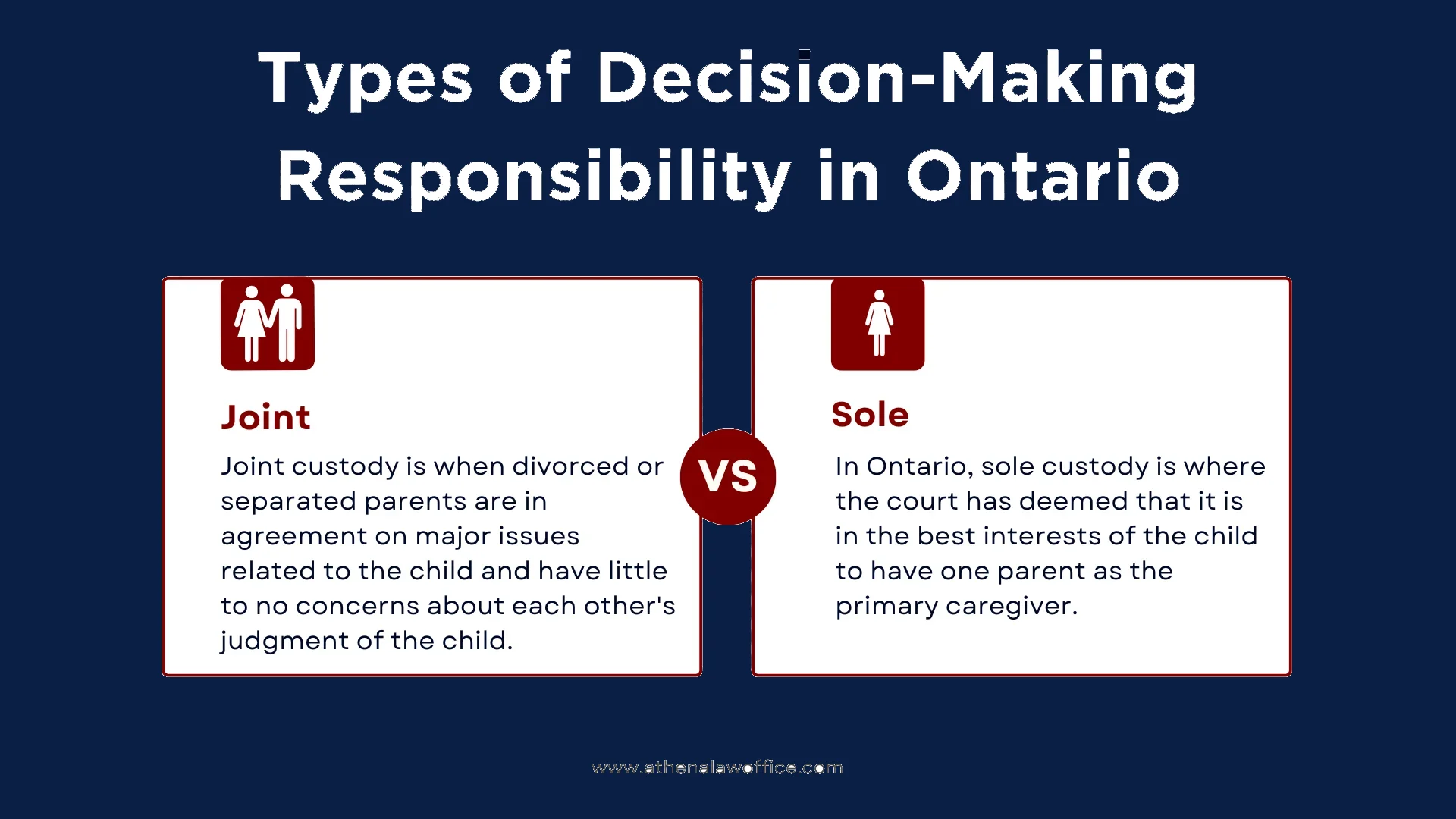
There are two primary types of child custody in Ontario, or decision-making responsibility. We have explained each one in detail:
Joint Decision-Making Responsibility
Joint custody is when divorced or separated parents are in agreement on major issues related to the child and have little to no concerns about each other’s judgment of the child.
Joint custody in Ontario is when both parents share rights and responsibilities pertaining to the child. They have an equal say regarding major life decisions, and one parent cannot alone make decisions about the child’s care.
Visitation and access arrangements may vary, depending on what’s best for the child and other factors related to the specific circumstances of the case.
Sole Decision-Making Responsibility
In Ontario, sole custody is where the court has deemed that it is in the best interests of the child to have one parent as the primary caregiver.
The primary parent will have the final say in the decisions related to the child, such as welfare, education, and health.
Courts will usually reach such decisions when the parents aren’t doing well with co-parenting after divorce, or there is a history of abuse and threats toward the child.
Please note that the other parent may or may not have rights to visitation and access. The idea of such custody is to eliminate any concerns or risks to the life of the child.
Parenting Time Arrangements in Ontario under the Divorce Act
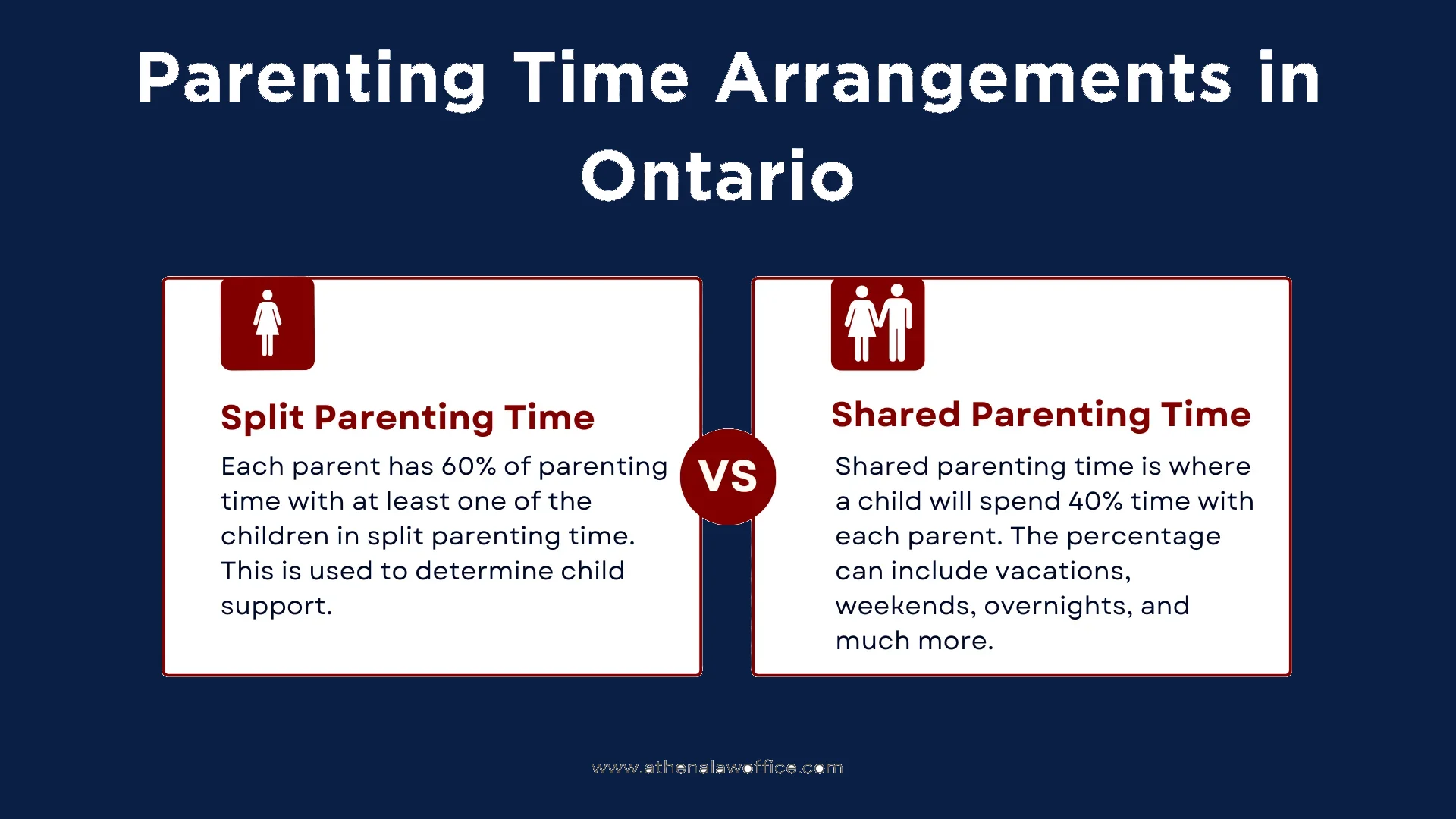
Access is now known as parenting time. Here are the various parenting time options for both parents under the new Divorce Act terminology:
Split Parenting Time (Formerly Known as Split Custody)
Split parenting time is not too common, and it is when the parents have more than one kid together. In this type of arrangement, each parent has one or more of the children under their primary care.
For example, each parent has 60% of parenting time with at least one of the children. This is used to determine child support and used to be known as split custody.
Shared Parenting Time (Formerly Known as Shared Custody)
Shared parenting time is based on the amount of time that the child spends with each parent. The purpose of this is to determine the respective child support responsibility of each parent.
According to the Child Support Guidelines, shared parenting time is where a child will spend 40% time with each parent. The percentage can include vacations, weekends, overnights, and much more.
Does Child Custody Impact Child Support Payments?
Under the Federal Child Support Guidelines, there are different criteria that are used to determine child support payments. You can read our detailed blog on child support in Ontario for this information as well.
However, factors that affect child support payments include the following:
- If there is shared parenting time, then one parent will be likely to pay child support. However, courts will also consider other factors in this situation.
- If the child spends more than 60% of the time with one parent, then the other one will pay child support. Joint decision-making responsibility will not change these payments.
So, child custody in Ontario will affect payments based on the above arrangements. Your family lawyer will assess your situation better and let you know what you can expect from the courts regarding such decisions.
Grounds for Full Custody of Child in Canada
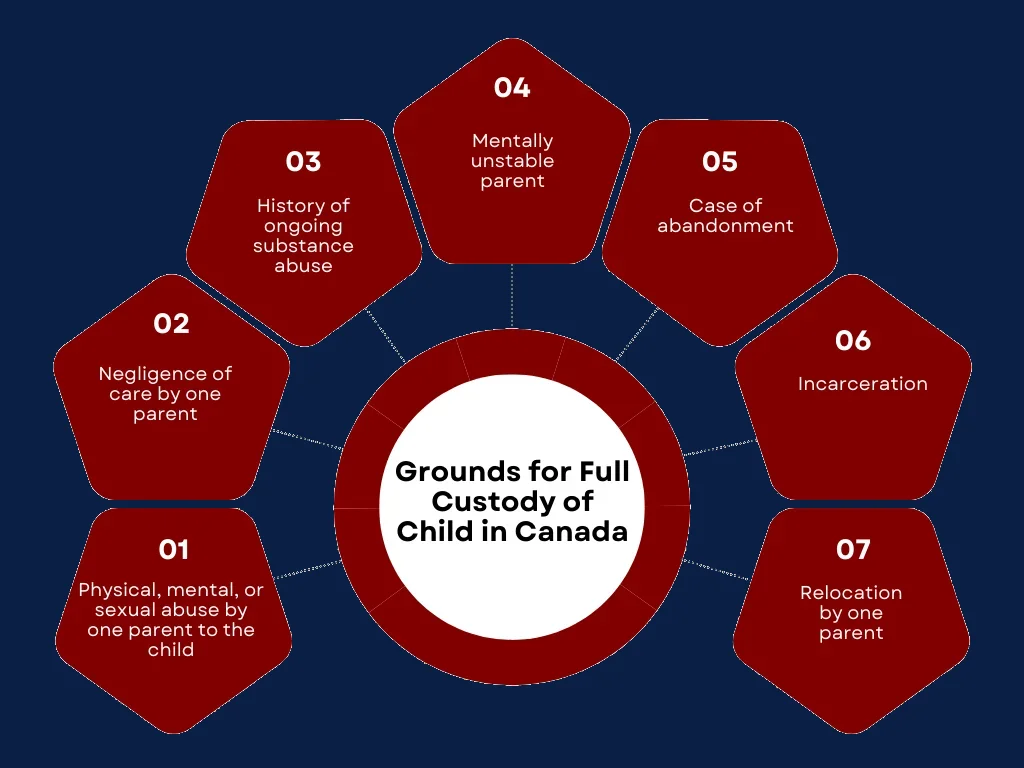
Sometimes, your marriage may not end on the right terms, and you may want full or sole custody of your child in Canada. There are various grounds that determine this case while filing for divorce.
We have listed some of the grounds that you can use to apply for full custody of your children in Canada:
- Physical, mental, or sexual abuse by one parent to the child
- Negligence of care by one parent
- A history of ongoing substance abuse
- Mentally unstable parent
- Case of abandonment
- Incarceration
- Relocation by one parent
These are the top seven grounds for full custody of children in Canada. If your ex-partner fulfills any of these grounds, you can apply for sole custody to ensure the best interests of the child.
How to File for Full Custody in Ontario
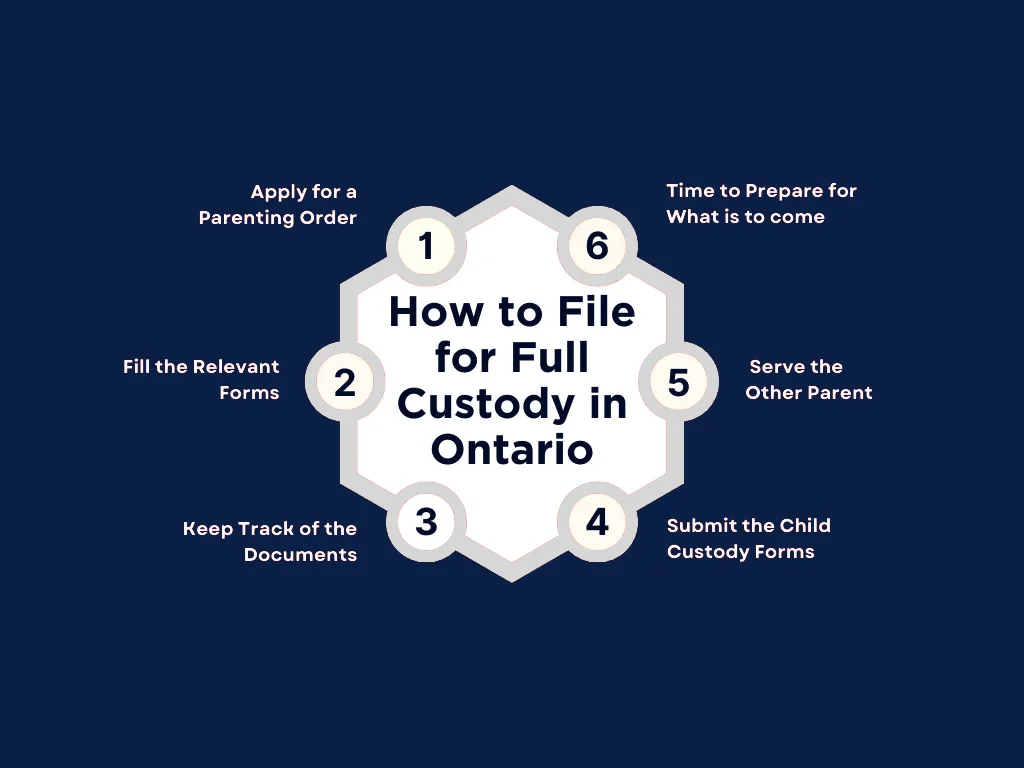
If you want to file for full custody in Ontario, you can also do it without a family lawyer.
Let’s review the steps you can follow to file for full child custody in Ontario:
Step 1: Apply for a Parenting Order
The first thing you need to do is apply for a parenting order. You will have to apply to the municipality where your child loves.
Some options you have in Ontario include:
- Superior Court of Justice: if your municipality doesn’t have a branch for Family Court, you can apply for the order here
- Family Court Branch: Check your municipality for such a branch and submit the order here
- Ontario Court of Justice: If your municipality doesn’t have either branch and you’re not married, then you can submit the order here
Check the municipality where your child is residing and then decide where you can apply for the parenting order to get child custody in Ontario.
Step 2: Fill the Relevant Forms
Depending on your case and what you want, there are different forms you will have to fill out to get child custody in Ontario.
Let’s review what forms and applications you will have to fill out, depending on what you want:
| Type | Forms & Applications to Fill |
| Parenting Time and Decision-Making Responsibility | 1. General application
2. Affidavit 4. Child support forms (if applicable) 5. Nonparents wanting child care and time |
| Child Support | 1. Financial statement
2. Support deduction order 3. Proof of income |
| Parenting Order | 1. General application
2. Affidavit |
We recommend you make five copies of everything you submit for child custody in Ontario. Three of these copies will go to the court, one to you and one to the other parent.
Be sure to also include your email address on every form you submit. The new forms will have the latest terminology, so don’t get confused if you don’t see custody or access on the forms.
Step 3: Keep Track of the Documents
To keep track of all the documents you submit for child custody in Ontario, every case requires a continuing record. In this record, you must write all the forms you have filled out and create a record.
As you update the record with new additions or updates, you will have to resubmit this record to the court.
Step 4: Submit the Child Custody Forms to the Court
The good thing about filing for child custody in Ontario is that you can submit most of the forms online. However, you will have to submit some documents in person, such as the continuing record.
Be sure to check the right family court location for the documents you have to submit in person. Wherever you apply, you will receive a version of your application that will be signed and dated by the court clerk.
On the other hand, the clerk will also give you a file number and a notice to attend the Mandatory Information Program session.
The Ontario Court of Justice doesn’t have any filing fees for the documents. However, if you apply to the Superior Court of Justice or to the Family Court Branch, you will have to pay a certain filing fee to the courts.
If you think you can’t afford these costs, then you can apply for a fee waiver.
Step 5: Serve the Other Parent
If you applied for full or sole child custody in Ontario, then you will have to submit copies of all the forms to the other parent. You must use a special service within six months to serve the notice to the other parent.
Here is a list of things the other parent should receive when you serve them:
- A copy of the application signed and dated by the court clerk
- A copy of the continuing record
- A blank answer form
- Acknowledgement of Service (if you serve the documents through mail)
- A police record check that is less than ten days old (this is applicable if you are not a parent but are applying for contact)
- Form 8.0.1 Automatic Order (if you have applied for divorce also)
The person who will serve these forms to the other parent will also have to fill out an affidavit of service and sign it in front of a commissioner or notary. They will also charge you a fee of $21.
Step 6: Time to Prepare for What is to come
If the other parent disagrees with this, they will have thirty days to file an answer. If they don’t answer, this means they agree to everything you have filled in the forms.
Till then, it is best to wait and see what happens and how the other parent responds. If they agree, then you will automatically get sole child custody in Ontario.
Can the Father Get 50/50 Custody in Ontario?
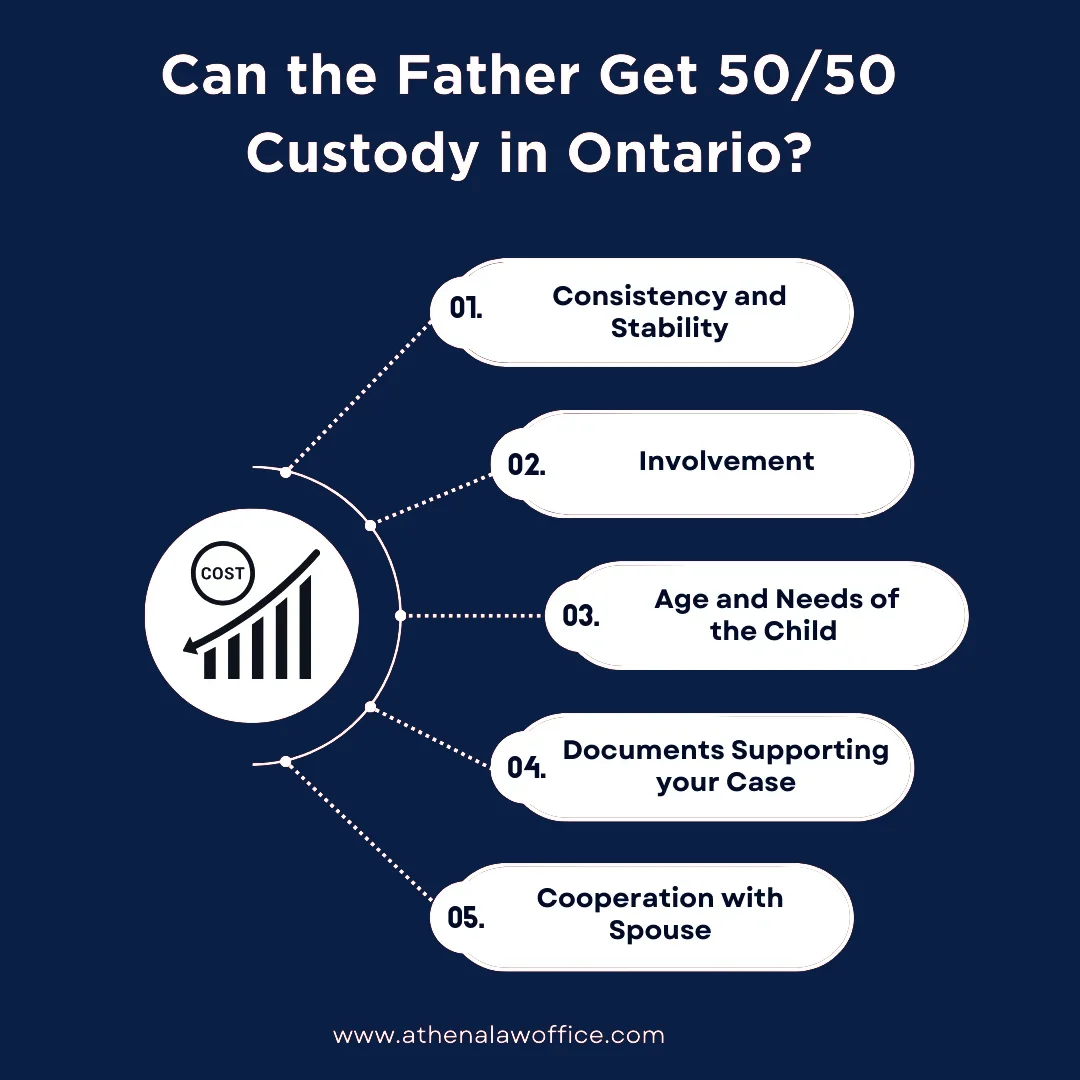
There are certain circumstances where the father can get 50/50 child custody in Ontario. If you are a father looking for such a parenting arrangement in Ontario, then here are some things you can show to the courts:
- Consistency and Stability: You must demonstrate to the courts that you can provide a consistent schedule and stability to your child.
- Involvement: Fathers looking for 50/50 custody in Ontario must show that they are actively involved in the child’s life. For example, they attend events, opt for caregiving, and more. All of this makes your case stronger for 50/50 custody.
- The Age and Needs of the Child: The courts always take into account the best interests of the child. The age and needs of your child will determine the court’s decision. Older children or ones who will benefit from shared parenting time will be more likely to get 50/50 custody.
- Documents Supporting your Case: You must submit evidence demonstrating your strong and healthy relationship with your child. These can include witness statements, pictures, letters, and anything else to help strengthen your case.
- Cooperation with Spouse: Fathers must also demonstrate that they are willing to cooperate with their previous spouse to ensure the best interests of the child.
All of these factors will help strengthen your case. Fathers requiring 50/50 child custody in Ontario must focus on these factors to have a better chance at equal parenting time and decision-making responsibility.
On the other hand, the courts may refuse your application for parenting time if they think you will harm the child, the other parent, or you will not return child to the other parent.
The courts will take all of these factors into account before they decide how they will split the parenting time for the children.
Who Decides Child Custody in Ontario?
The judge will determine who will get child custody in Ontario. They will assess the facts of the case to determine parenting time, decision-making responsibilities, and much more.
Because of this, it is crucial to hire the right child custody lawyers to work on your case. They will stand for your rights and ensure you receive a fair outcome.
However, you can also resolve parenting time and decision-making responsibility outside the court, which we will discuss below.
Top 4 Ways to Decide Child Custody in Ontario without Going to Court
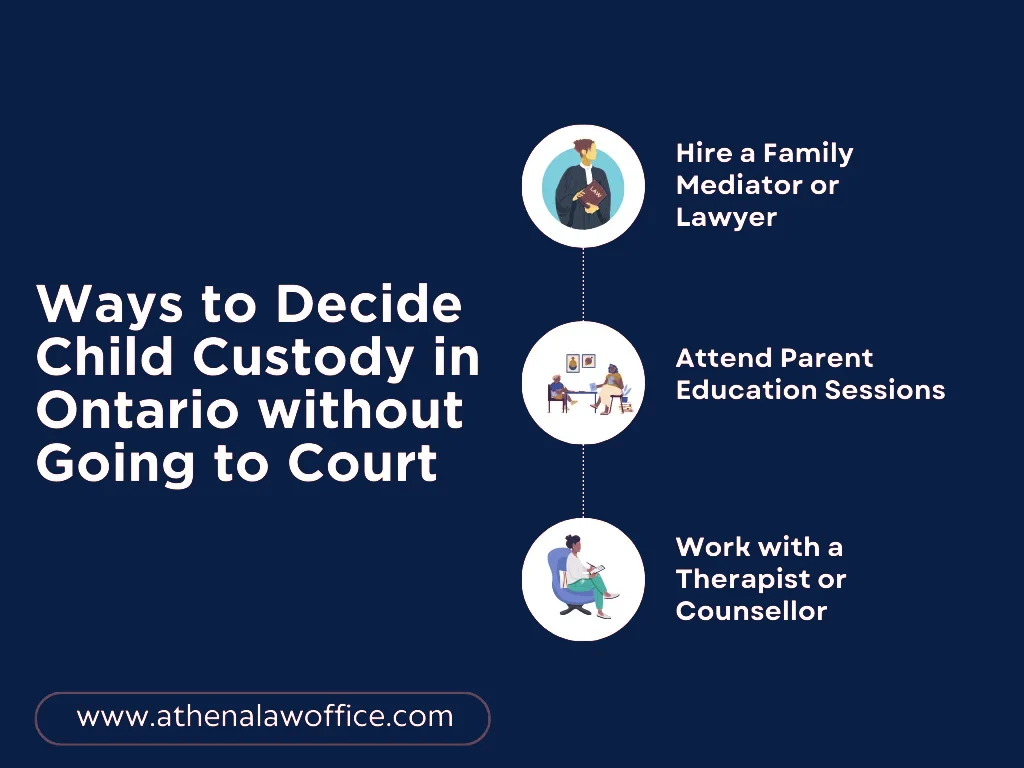
While a judge decides most child custody cases in Ontario, there are also some other routes you can take without going to court. If you and your ex-partner are on civil terms, we recommend taking this route to ensure you and your co-parent have the power to make decisions for your child.
You can use alternative methods to resolve parenting time and decision-making responsibilities. Some of these routes include the following:
1. Hire a Family Mediator
One of the top options at your disposal is to hire a family mediator to decide on child custody in Ontario. Mediators have legal and social work backgrounds along with the right training to help people resolve disputes.
A divorce or family mediator will work as a neutral party to help discuss with parents and decide the best arrangement for the children involved. So, if you don’t want to go to court, a mediator can be your next best bet.
2. Opt for a Child Custody or Family Lawyer in Ontario
Another option you can benefit from is to hire a family lawyer in Ontario. Both of you will have to hire separate lawyers to ensure you understand your legal obligations and rights.
They can help you negotiate a parenting agreement that will set out the details of your parenting time and decision-making responsibilities. If you are going through a separation, you can also make these things part of your separation agreement in Ontario.
3. Attend Parent Education Sessions
Many courts in Canada host education sessions for parents. These offer parents various options to settle disputes and issues regarding divorce, separation, child custody, and much more.
They also discuss the impact of these changes on the child. So, if you want to educate yourself about this matter and find alternative options to court, you can attend one of these sessions.
4. Work with a Therapist or Counsellor
Finally, you and your ex-partner can also work with a therapist or counsellor to resolve your issues. Opt for a counsellor who specializes in these issues so they can help you resolve your conflicts.
Then, you can create an agreement and follow that to ensure you are keeping the best interests of your children in mind.
Child Custody Agreement Template Canada
You can also follow a child custody agreement template in Canada to come up with a parenting plan for your children. This will allow you to determine parenting time and decision-making responsibilities serving the best interest of the children.
Here is an official tool for a parenting plan you can follow by the Government of Canada. You can use this as a child custody agreement template to help you decide important matters regarding your children.
FAQs
Who wins most child custody cases?
Historically, women have won the most child custody cases. They are awarded child custody much more easily than men.
What do judges look for in child custody cases in Ontario?
Judges check which parent can fulfill the basic emotional, physical, and mental needs of the child. They also check whether the parent can provide education, guidance, and stability. If the child has a disability or special needs, they check whether one parent can better take care of the child than the other.
What is the age limit for child custody in Ontario?
When the child reaches the age of majority (18 years old), child custody will end. However, if the child is still dependent on the parents or they have special needs, then this number might be different.
How long does child custody court take in Ontario?
A trial of child custody in Ontario can take anywhere between a few days to weeks or months. It depends on the complexity of the case and the various factors involved. Your family lawyer will answer this question better for you based on the facts of the case.
Final Thoughts
Child custody in Ontario is a complex matter that takes a lot of factors into account when deciding who will get custody. Every case is unique, which is why the results can differ based on the unique circumstances of your case.
For more information regarding custody in Ontario, you can get in touch with our child custody lawyer. We will be more than happy to answer your queries and assist you in any way possible.
Author Profile

- Barnett Law is a trusted and knowledgeable lawyer in Scarborough. Her expertise spans real estate law, family law, adoptions and fertility law. A lawyer by profession and a humanitarian by heart, Athena Narsingh Barnett wants to help people become more familiar with the legal system and be well-informed to make important legal decisions.
Latest entries
 Real Estate LawJanuary 30, 2026Non Resident Speculation Tax Explained For Beginners
Real Estate LawJanuary 30, 2026Non Resident Speculation Tax Explained For Beginners legal guidanceNovember 12, 2025How To Avoid Land Transfer Tax Ontario?
legal guidanceNovember 12, 2025How To Avoid Land Transfer Tax Ontario? legal guidanceOctober 31, 2025How Much Is Land Transfer Tax In Ontario?
legal guidanceOctober 31, 2025How Much Is Land Transfer Tax In Ontario? Family LawOctober 27, 2025How Much Does A Divorce Cost In Ontario In 2025?
Family LawOctober 27, 2025How Much Does A Divorce Cost In Ontario In 2025?

